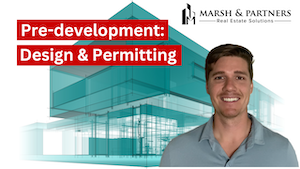Assembling Your Real Estate Development Team: Hiring for Your Project
Real estate development is a team sport. A successful project is the culmination of the various real estate experts and service providers and their efforts to support the development.
No single individual can undertake an entire development themselves – the difference between failed, and successful developers is often a result of the team they’ve built around them.
So, before you undertake a project, it’s important to understand the key members of the real estate development team – their roles and responsibilities and how they fit into the project's overall scope.
But also critical is understanding what you should be looking for in your team members. More time and care may be required when hiring key roles like your project’s civil engineer, architect, and general contractor than your electrical engineer, for instance. That's not to discount the importance of the expertise each outside consultant brings to the project, but rather to stress the significance of each individual hire.
This article will cover the key players you should consider hiring or having available when assembling your property development team. We will also discuss what you should look for when bringing on team members and how to manage your team most effectively as a real estate developer.
The key players of a real estate development team
Real estate developer
The real estate developer is the individual or the firm responsible for coordinating and overseeing the construction of residential or commercial real estate.
Typically, the developer will purchase a piece of raw land, craft a vision for the property, and navigate that vision through land entitlement and ultimately through construction.
Because a real estate developer is overall responsible for the entire project, they need to be expert managers, delegators, and team builders. The real estate developer will assemble the development team and drive the process forward.
No formal training or degree is required, but many developers transition from other fields of real estate or engineering. And because the real estate development process is so extensive, it can take decades to master.
Developers should have expertise and experience in the following fields:
- Structuring land contracts and negotiation
- Land acquisition
- Site selection
- Real estate development budgets and feasibility studies
- Project and construction management
If you want a deeper dive into becoming a developer, check out our article on how to begin in real estate development.
Real estate consultant
As technology has improved over the years and innovation has caused entire industries to evolve, the real estate business has remained essentially unchanged.
It remains segmented into disjointed functions – each real estate service provider has their specific siloed expertise. For example, real estate agents are transactional and handle paperwork, attorneys and lenders have their defined roles, and each support consultant has their niche of expertise.
But a real estate development project requires all these skills to be working in concert with one another.
A real estate consultant offers a bridge between the unique skillsets of the different service providers – blending the siloed functions of each discipline, helping the developer and any stakeholders make better-informed investment and business decisions.
Additionally, because real estate consultants have a wide range of experience and expertise, they can serve as the ultimate risk mitigation measure. You don’t know what you don’t know, and they’ll help challenge some of your traditional assumptions, fill in your knowledge gaps, and create the optimal development strategy for your objectives.
Project manager
The role of a project manager as part of a real estate development is to manage the day-to-day duties and tasks related to the project. These duties can be controlled by the real estate developer, an outside real estate consultant, or even a dedicated 3rd party project manager.
The project manager should be an expert in task and personnel management, and they should have a good grasp of the process of real estate development.
It’s not uncommon that developments face roadblocks and stall at various stages during a project. The project manager is responsible for handling these setbacks and ensuring that all support consultants move as efficiently and expeditiously as possible.
The longer a project takes, the more carrying costs you'll rack up without the development producing any income. So, you’ll want to hire a project manager that has experience meeting deadlines and delivering on promised outcomes.
Real estate attorney
Successful real estate developers learn to master the skill of risk mitigation. Even the most experienced developers haven’t faced every possible situation that may pop up during a project. But if you’ve adequately protected yourself, you can limit negative consequences.
A quality real estate attorney should be a part of your risk mitigation strategy. They will help with drafting and reviewing legal documentation, but they will also assist in the property's title work and ownership search.
Your attorney's main job is as an advisor – real estate developers should leverage their expertise throughout a project. So don’t skimp on an attorney and find someone you trust will give you objective feedback.
Civil engineer
In terms of team members critical to the success of a development project, a civil engineer is right up there.
They are experts in the site planning and design of a project based on the topography and physical characteristics of the land.
Civil engineers are also experts in the local design and development ordinances and the political and bureaucratic processes required to obtain site plan approval. As a result, they will serve as a critical resource in helping you navigate the land entitlement process.
But not every civil engineer is created equal. And to ensure you hire the right civil engineer, you'll want to make sure they have experience in the type of development you're proposing and political connections in the governing municipality.
A well-connected engineer will have a better pulse on what types of developments are being approved and can help mitigate the risk of you pursuing a dead-end project. They may also afford you direct access to various governmental departments, which usually translates to quicker answers and a smoother approval process.
Architect
An architect is someone who plans and designs the construction of buildings. They’ll be responsible for drafting building plans according to code and play a key role in ensuring the design is adhered to throughout the construction process.
Your project architect should have experience in the type and scale of the proposed project. For example, you don't want to hire an architect specializing in large distribution facilities for your mixed-use project – it requires an entirely different skillset and eye for design.
Don’t discount the quality of their work either. A well-designed and adequately programmed building is critical to the efficiency of the space. And a development that brings a unique design to life can help promote organizational culture or foster a sense of community amongst its inhabitants and users.
Landscape architect
The interaction between a building and its landscape features is a frequently overlooked aspect of real estate development.
A landscape architect will help with land planning and is responsible for designing the natural environment and outdoor amenity space related to a project.
Geotechnical engineer
Before you begin any land development, you need to make sure that you can safely construct a building on the site.
Your geotechnical engineer will produce a geotechnical survey that analyzes a site’s soil composition and any subsurface conditions that could impact construction. Most importantly, their job is to ensure that the ground can support foundations and any buildings – their report will help your civil engineer with site planning and design.
Land surveyor
Technological advancements in satellite imagery have come a long way over the years and help developers make informed land planning decisions early.
But in reality, a site almost always looks a little different on the ground. And encumbrances like easements, wetlands, and determinable streams can considerably impact the amount of developable area a site has.
A quality land surveyor is invaluable to a project. They are responsible for creating a graphic depiction of a property for design and construction purposes. This usually includes measuring a site and researching any conditions that affect a property.
A land surveyor will work closely with the real estate developer, civil engineer, and other key stakeholders throughout a project.
Environmental consultant
Every site has its own unique set of environmental characteristics. An environmental consultant will help you navigate those unique ecological challenges through site selection, real estate due diligence, and planning and development.
Most development projects call for at least a phase I environmental site assessment to identify existing environmental liabilities. But your environmental consultant will also help you through wetland and stream determination and any associated permitting that may be required.
Each state has its own permitting process, but a consultant with a breadth of experience and a healthy relationship with The U.S. Army Corps of Engineers could prove invaluable for your development project.
Land-use attorney
Depending on the nature of a project, a land-use attorney may or may not be necessary.
In some cases, the property zoning and a site’s allowable use align with your proposed project. In other cases, a rezoning or conditional use permit may be required before you begin construction. If your project design doesn’t meet development standards, you might instead have to get a zoning variance.
A land-use attorney is an expert in all legal matters pertaining to land, zoning laws, and municipal considerations related to construction. They are an essential resource in helping you navigate development regulations.
General contractor (GC) / builder
A general contractor is one of the most critical roles on any real estate development team. The contractor is responsible for the actual construction of the building – they'll manage and oversee any subtractors, vendors, and other tradespeople throughout the process.
As you select a general contractor for your project, it’s important to keep a couple of things in mind:
- Your GC is responsible for obtaining any requisite building and construction permits – are they well-versed in your area's permitting process?
- Do they have a history of completing projects promptly, on budget, and to code?
- Are they predisposed to working well on a team?
- Do they have experience in the type of project you’re proposing?
Spend some time interviewing a couple of contractors until you find one you're comfortable with. As a real estate developer, you'll be interacting with the GC frequently, and it's important to have a solid working relationship.
Structural engineer
A structural engineer is responsible for designing a building's foundation and framework. They will work in conjunction with the architect to ensure the facility is designed safely and is structurally sound – with the ability to withstand things like earthquakes, wind, snow, and various types of loads on the building.
The structural engineer will also participate throughout the construction process to ensure that the building conforms to the engineering requirements in the design.
Mechanical engineer
Mechanical engineers analyze and design mechanical systems and power-producing machines. They'll be responsible for designing any refrigeration or HVAC systems, ventilation, elevators, and generators for your project.
Your mechanical engineer will work closely with the lead architect to ensure these mechanical systems' safe and efficient design and help supervise their construction during development.
Electrical engineer
The electrical engineer is responsible for designing and supervising the manufacturing and construction of any electrical systems and components for a project.
They will assist the architect when drafting building plans and ensure all electrical systems are designed safely and to code.
Lender
Securing and structuring development financing for a project is a challenge developers face regardless of experience level.
Real estate developments are expensive – and a project's capital stack is usually comprised of both debt and equity financing. A good working relationship with a real estate lender will prove invaluable if you need to secure debt financing. In some cases, they have relationships with equity sources as well.
A real estate lender will not only underwrite the project specifics, but they’ll also underwrite you as a developer – your experience, resume, and overall risk profile.
So, the better your relationship with an experienced lender, the more likely you’ll get competitive financing for your project.
Real estate agent
Depending on the nature of your project, a real estate agent may be necessary to create a marketing and sale or lease-up plan.
In some cases, pre-leasing activities may be necessary. A proactive real estate agent with an extensive network of prospective tenants is critical to a successful lease-up. In other cases, you may be developing a project for sale on the back end – an agent with marketing expertise and a Rolodex of investors will prove invaluable.
Having several relationships with agents that have different proficiencies and skillsets is essential.
Property manager
A quality property manager is worth their weight in gold. They are an often underappreciated member of the development team but are responsible for managing the property once it's delivered.
Your property manager will handle all rent collection, maintenance, tenant screening, and leasing activities associated with the property. They are also primarily responsible for executing the real estate developer’s business plan related to the long-term ownership of the asset.
Spend some time interviewing property managers to assess their experience handling properties and projects like yours. A property manager's expertise may also factor in how risky a lender views a project and could affect development financing.
Accountant
Another critical member of the land development team is an accountant. An accountant with experience in real estate development can help you optimally structure the deal and stay on top of project budgeting and cash flow.
Sometimes development projects incorporate more nuanced aspects of tax law – opportunity zone funds, 1031 tax-deferred exchanges, and low-income housing tax credits, among others. These special tax situations need to be handled properly to keep a project progressing and avoid running afoul with the IRS.
A quality accountant will assist in substantially reducing your tax exposure throughout a development project.
How to hire the right property development consultants
Team building is a learned skill. And assembling a real estate development team presents some additional challenges because each team member has a specialized experience in a particular field. In addition, each outside consultant is a subject matter expert and often the single point of failure for their project deliverables.
So as a real estate developer, that means a couple of things:
- Only hire consultants who have relevant experience in similar types of projects
- Vet a consultant’s ability to work well and collaborate with a team
- Make sure a consultant has the time and capacity to be able to take on your project and offer adequate attention
- If possible, add team members that have exposure to other aspects of the real estate development process outside of their field
Before I bring on a consultant to help with a project, I evaluate them personally and professionally. I like to discuss what makes me tick – my goals and aspirations as a developer and what kinds of opportunities really excite me. I believe that building a cohesive team starts with a shared vision and aligned philosophy, and having those intimate conversations early helps me assess whether they’ll be a good fit.
Managing your development team
Because the development team is comprised of a group of individuals with unique expertise, a developer must rely heavily on the knowledge and recommendations of their team members.
Enabling a consultant to operate with relative autonomy will create a culture of mutual trust between the developer and the development team.
But that also presents risks – a single point of failure can lead to massive cost and time overruns.
As the real estate developer, you should have enough knowledge of everyone’s role to spot-check and confirm the quality and accuracy of work.
Consider the following areas of focus when managing your real estate development team:
- Allow your consultants maximum freedom to do their jobs until they give you a reason to
- Establish clear goals and objectives before each phase of the project begins
- Only schedule meetings when absolutely necessary – begin each meeting with a clear timeline and set of objectives, and end each session with a list of actions items
- Remain constantly optimistic, especially in public – development projects are exercises in patience and resilience. Negative thoughts have a habit of bringing about negative outcomes
- Spot check work at various milestones – this offers an opportunity to commend quality work and avoid big compounding mistakes
Leveraging the expertise of a real estate consultant
No one claimed assembling a real estate development team was easy. In fact, outside of financing, it’s probably the biggest reason why development projects never come to fruition.
Consider leveraging the expertise of a real estate consultant to help you build out your development team. They'll have experience working with the various professionals associated with a project and can help you interview and hire the right folks.
The real estate industry isn’t built to serve project stakeholders.
A real estate consultant, especially one with development experience, can assist you in making more informed decisions and help you maximize the value of your real estate projects and investments.
Learn more about our real estate consulting services here or begin the conversation today and book a free consultation call.



